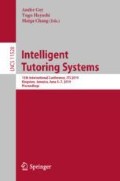Abstract
Providing adaptive feedback to learners engaging in collaborative learning activities is one research topic in the development of intelligent tutoring systems. However, there is a need to investigate how to systematically evaluate a learner’s activities and provide feedback on them. The present study investigates how emotional states, detected through facial recognition, can be utilized to capture the learning process in a simple jigsaw-type collaborative task. It was predicted that when learners argue with each other and reason deeply, they may experience several emotional states such as positive and negative states. The results show that when learners work harder on developing a mutual understanding through conflictive interaction, negative emotions can be used to predict this process. This study contributes to the knowledge of how emotional states detected by facial recognition technology can be applied to predict learning process in conflictive tasks. Moreover, these empirical results will impact the development of adaptive feedback mechanisms for intelligent tutoring systems for collaborative learning.
Access this chapter
Tax calculation will be finalised at checkout
Purchases are for personal use only
References
Aronson, E., Patnoe, S.: The Jigsaw Classroom: Building Cooperation in the Classroom, 2nd edn. Addison Wesley Longman, New York (1997)
Azevedo, R., Cromley, J.: Does training on selfregulated learning facilitate students’ learning with hypermedia? J. Educ. Psychol. 96(3), 523–535 (2004)
Biswas, G., Leelawong, K., Schwartz, D., Vye, N.: Learning by teaching: a new paradigm for educational software. Appl. Artif. Intell. 19(3), 363–392 (2005)
Chi, M., Leeuw, N., Chiu, M., Lavancher, C.: Eliciting self-explanations improves understanding. Cogn. Sci. 18(3), 439–477 (1994)
von Davier, A.A., Hao, J., Liu, L., Kyllonen, P.: Interdisciplinary research agenda in support of assessment of collaborative problem solving: lessons learned from developing a collaborative science assessment prototype. Comput. Hum. Behav. 76, 631–640 (2017)
D’Mello, S., Lehman, B., Pekrun, R., Graesser, A.: Confusion can be beneficial for learning. Learn. Instr. 29, 153–170 (2014)
Fiore, S.M., Rosen, M.A., Smith-Jentsch, K.A., Salas, E., Letsky, M., Warner, N.: Toward an understanding of macrocognition in teams: predicting processes in complex collaborative contexts. Hum. Factors 52, 203–224 (2010)
Graesser, A., Chipman, P., Haynes, B., Olney, A.: AutoTutor: an intelligent tutoring system with mixed-initiative dialogue. IEEE Trans. Educ. 48(4), 612–618 (2005)
Graesser, A., McNamara, D.S.: Computational analyses of multilevel discourse comprehension. Top. Cogn. Sci. 3(2), 371–398 (2011). https://doi.org/10.1111/j.1756-8765.2010.01081.x
Hayashi, Y.: On pedagogical effects of learner-support agents in collaborative interaction. In: Proceeding of the 11th International Conference on Intelligent Tutoring Systems (ITS 2012), pp. 22–32 (2012)
Hayashi, Y.: Togetherness: Multiple pedagogical conversational agents as companions in collaborative learning. In: Proceeding of the 12th International Conference on Intelligent Tutoring Systems (ITS 2014), pp. 114–123 (2014)
Hayashi, Y.: Coordinating knowledge integration with pedagogical agents: effects of agent gaze gestures and dyad synchronization. In: Proceeding of the 13th International Conference on Intelligent Tutoring Systems (ITS 2016), pp. 254–259 (2016)
Hayashi, Y.: Gaze feedback and pedagogical suggestions in collaborative learning. In: Nkambou, R., Azevedo, R., Vassileva, J. (eds.) ITS 2018. LNCS, vol. 10858, pp. 78–87. Springer, Cham (2018). https://doi.org/10.1007/978-3-319-91464-0_8
Hayashi, Y.: The power of a “maverick” in collaborative problem solving: an experimental investigation of individual perspective-taking within a group. Cogn. Sci. 42(S1), 69–104 (2018). https://doi.org/10.1111/cogs.12587
Hesse, F., Care, E., Buder, J., Sassenberg, K., Griffin, P.: A framework for teachable collaborative problem solving skills. In: Griffin, P., Care, E. (eds.) Assessment and Teaching of 21st Century Skills. EAIA, pp. 37–56. Springer, Dordrecht (2015). https://doi.org/10.1007/978-94-017-9395-7_2
Koedinger, K.R., Anderson, J.R., Hadley, W.H., Mark, M.A.: Intelligent tutoring goes to school in the big city. Int. J. Artif. Intell. Educ. (IJAIED) 8, 30–43 (1997)
Kuilenburg, v.H., Wiering, M., Uyl, d.M.: A model based method for automatic facial expression recognition. In: Proceedings of the European Conference on Machine Learning (ECML2005), pp. 194–205 (2005)
Kumar, R., Rose, C.: Architecture for building conversational architecture for building conversational agents that support collaborative learning. IEEE Trans. Learn. Technol. 4(1), 21–34 (2011)
Lave, J., Wenger, E.: Situated Learning - Legitimate Peripheral Participation. Cambridge University Press, Cambridge (1991)
Leelawong, K., Biswas, G.: Designing learning by teaching agents: the Betty’s brain system. Int. J. Artif. Intell. Educ. 18(3), 181–208 (2008)
Matsuda, N., Yarzebinski, E., Keiser, V., Raizada, R., Stylianides, G.J., Koedinger, K.R.: Studying the effect of a competitive game show in a learning by teaching environment. Int. J. Artif. Intell. Educ. 23(1), 1–21 (2013)
McNamara, D., O’Reilly, T., Rowe, M.: iSTART: A Web-Based Tutor that Teaches Self-explanation and Metacognitive Reading Strategies. Lawrence Erlbaum Associates, Mahwah (2007)
Meier, A., Spada, H., Rummel, N.: A rating scheme for assessing the quality of computer-supported collaboration processes. Int. J. Comput.-Support. Collab. Learn. 2(1), 63–86 (2007). https://doi.org/10.1007/s11412-006-9005-x
Metcalfe, J., Wiebe, D.: Intuition in insight and noninsight problem solving. Mem. Cogn. 15(3), 238–246 (1987)
Miyake, N.: Constructive interaction and the interactive process of understanding. Cogn. Sci. 10(2), 151–177 (1986)
OECD: PISA 2015 Results (Volume V): Collaborative Problem Solving. OECD Publishing, Paris (2017). https://doi.org/10.1787/9789264285521-en
Shirouzu, H., Miyake, N., Masukawa, H.: Cognitively active externalization for situated reflection. Cogn. Sci. 26(4), 469–501 (2002)
VanLehn, K., Graesser, A.C., Jackson, G.T., Jordan, P., Olney, A., Rosé, C.P.: When are tutorial dialogues more effective than reading? Cogn. Sci. 31(1), 3–62 (2007). https://doi.org/10.1080/03640210709336984
Vygotsky, L.S.: The Development of Higher Psychological Processes. Harvard University Press, Cambridge (1980)
Acknowledgments
This work was supported by Grant-in-Aid for Scientific Research (C), Japan Society for the Promotion of Science (JSPS) KAKENHI Grant Number 16K00219.
Author information
Authors and Affiliations
Corresponding author
Editor information
Editors and Affiliations
Rights and permissions
Copyright information
© 2019 Springer Nature Switzerland AG
About this paper
Cite this paper
Hayashi, Y. (2019). Detecting Collaborative Learning Through Emotions: An Investigation Using Facial Expression Recognition. In: Coy, A., Hayashi, Y., Chang, M. (eds) Intelligent Tutoring Systems. ITS 2019. Lecture Notes in Computer Science(), vol 11528. Springer, Cham. https://doi.org/10.1007/978-3-030-22244-4_12
Download citation
DOI: https://doi.org/10.1007/978-3-030-22244-4_12
Published:
Publisher Name: Springer, Cham
Print ISBN: 978-3-030-22243-7
Online ISBN: 978-3-030-22244-4
eBook Packages: Computer ScienceComputer Science (R0)

